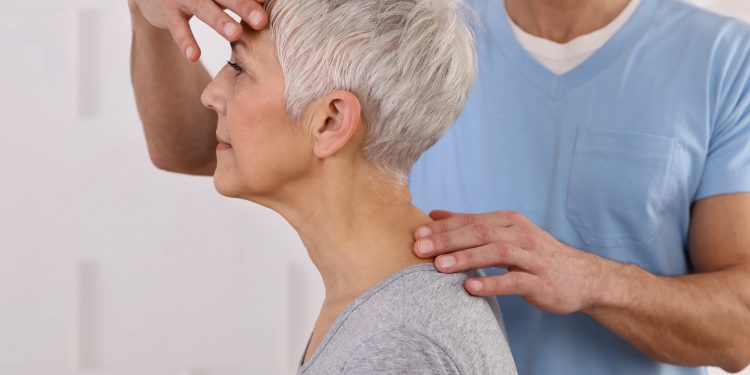by Jonathan Chung, DC
Persistent headache is the most common problem patients experience after suffering a concussion. A headache after a concussion usually resolves itself as the brain restores normal physiology within 10 days after the concussion occurs. When a headache persists beyond this window, there is a strong possibility that the pain generator is coming from somewhere in the neck.
Research has shown that whiplash injuries are extremely common in patients who suffer a concussion. The upper neck, in particular, has many muscles, ligaments, and nerve tissues that are susceptible to injury from a blow to the head. Injuries to these tissues often mimic the same symptoms as the concussion itself, especially when it comes to headaches. It’s also been shown that patients who suffer both a concussion and a neck injury tend to have worse outcomes and experience longer recovery times than patients who suffer a concussion but no injury to the neck.
Despite these research findings, the neck is often overlooked when it comes to treating patients with persistent post-concussive symptoms. Many neck injuries can be treated effectively, with good outcomes, after proper examination of the cervical spine but too often it’s ignored.
The easiest and most common way to determine if a headache is related to the neck is if the patient also experiences simultaneous neck/shoulder pain with loss of range of motion. However, many headache patients get significant relief from neck treatments even without neck pain as a complaint. Some common features of patients with headache of cervical origin include:
- Occipital Nerve Pain Patterns — patients can experience a severe headache that feels like a migraine, but is actually triggered by a problem called occipital neuralgia. Occipital neuralgia is a disorder where there is irritation or damage to the nerves at the top of the neck. It’s characterized by a pattern of pain that stems from the back of the head and can radiate over the top of the head or behind the eyes.
- Neck Tenderness That Triggers Headache Pain — patients sometimes have tender neck joints but not realize it until someone touches a sore spot. While the sore spot may be in the neck, pressing on this point may trigger or exacerbate a headache instead of neck pain. Patients with this type of pattern often tend to feel worse when getting a deep tissue massage of the neck because the pain receptors in the head and neck share a common origin in the brainstem. This allows injury in the head and face to cause a neck pain pattern and vice versa.
- Weak Endurance of Neck Muscles — patients with cervicogenic headache have been shown to have reduced endurance of their deep neck flexor muscles. The deep muscles of the neck play an important role in maintaining normal neck movement and alignment patterns. This strength is frequently lost after a neck injury.Patients who have reduced endurance in these neck muscles tend to have a tight and tender sternocleidomastoid muscle (SCM) in addition to showing a postural pattern where the chin juts forward.
You can test your neck endurance by lying down on your back and holding your head about an inch off the ground. You should be able to hold this position with the chin tucked and neck flexed for about 30-40 seconds, but patients with neck problems will struggle with this task.
Many more factors are important to consider in a post-traumatic headache patient. The patient should be evaluated by medical professional, a physical therapist with concussion specialty, or specific chiropractors with expertise in the cervical spine. Neck exercises, manual therapies, and specific upper cervical techniques can bring tremendous relief to patients, but a thorough exam must be performed to rule out ligament instability and other neurological conditions where exercises and certain techniques and therapies may be contraindicated for a head injury patient.
Jonathan Chung, DC, is the founder and upper cervical chiropractor at Keystone Chiropractic and Neuroplasticity in Wellington, Florida. Learn more about their cervical vestibular rehabilitation program at www.chiropractickeystone.com.











